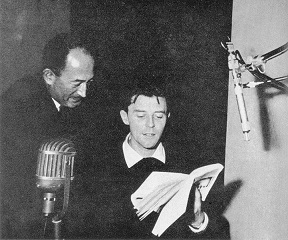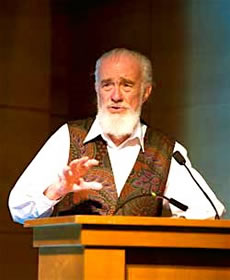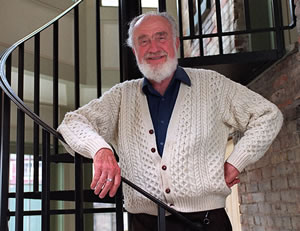De Duitse schrijver en scenarist Peter Zingler werd geboren op 5 januari 1944 in Chemnitz. Zie ook alle tags voor Peter Zingler op dit blog.
Uit: Vom Tunnel zur Himmelsleiter
„Der Typ, der vor dem Düsseldorfer Flughafen aus dem Taxi stieg, sah nicht aus wie ein Erste Klasse Passagier. Peter Zingler trug Jeans, Sweatshirt, eine kurze schwarze Lederjacke und auf dem Kopf die Batschkapp, unter der seine langen Haare hervorstrubbelten. Auch einen Vollbart hatte der Kerl, der sich nun vorsichtig sichernd umschaute, als fürchte er Ungemach. Für den kalten Januartag war er viel zu dünn angezogen und in seiner kleinen Leinentasche war sicher kein Platz für dicke Wintermäntel. Er betrat das Flughafengebäude, orientierte sich, passierte den Sicherheitscheck und stand dann vor der Passkontrolle. Wer ihn kannte, bemerkte die leichte Nervosität, das Schaben des rechten Fußes, dann die Gewichtsverlagerung auf den linken Fuß, bis der Grenzschutzbeamte den Pass zurückgab. Zingler bedankte sich, ging schnell einige Meter weiter außer Sichtweite, blieb stehen und atmete tief durch! Jetzt schlenderte er gemächlich zu einem Gate, auf dessen Anzeigetafel das Flugziel MONTEGO BAY zu lesen war.
Die erste Hürde hatte Peter Zingler geschafft.
Nun saß er in der Maschine, einer Lockheed TriStar der LTU, die langsam Fahrt aufnahm, so stark beschleunigte, dass der Rumpf zitterte und dann endlich abhob. Peter schaute aus dem Fenster auf Düsseldorf hinunter und lehnte sich entspannt zurück. Erst mal entkommen. Er sah sich in der Maschine um. Zwar war ihm schon am Gate aufgefallen, wie viele alleinreisende Frauen auf den Abflug nach Jamaika warteten, hübsche junge Frauen, alle im besten Studentenalter.“
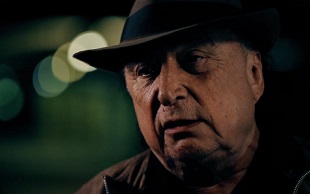
Peter Zingler (Chemnitz, 5 januari 1944)
De Russische schrijver Yevgeni Anatoljewitsj Popov werd geboren op 5 januari 1946 in Krasnojarsk, Sibirië. Zie ook alle tags voor Yevgeni Popov op dit blog.
Uit: De sigaar (Vertaald door Karel van het Reve)
“Er was eens een braaf meisje dat bij het station Oejar aan de Oostsiberische spoorweg woonde. Haar pa bleek een behoorlijke schoft en verdween op een keer met onbekende bestemming, en ma was altijd ziek. Ze had zelfs een keer naar het sanatorium ‘Het Sjira-meer’ gemogen. Ze was altijd maar ziek en ging dood, stil en onopgemerkt, bescheiden en pijnloos.
Het meisje begroef haar moeder en zette een kruis met foto op haar graf. Ma keek op de foto of ze leefde. Het meisje treurde een tijdje, nam afscheid van haar in leven gebleven oudtante en ging naar de stad.
En daar loopt ze op straat en opeens ziet ze op een paal geplakt een scheef papiertje:
‘Kamer voor meisje aleen. Op de Prokrovka.’
Ze ging naar het opgegeven adres dat van een gewiekste oude vrouw bleek te zijn van een bochelige constructie. Het mens vroeg drie maanden huur vooruit, en verbood alle bezoek want ze ‘wilde van haar huis geen bordeel maken’. Zelf bedronk de oude zich de eerste avond aan ‘Zonnegave’, liep de moestuin in en begon ruzie te maken met de buurvrouw. Die gooide haar met zonnebloemkoppen. De oude begon te gillen, keerde zich om en deed haar rok omhoog. Een onduldbare belediging, en de buurvrouw wierp zich dan ook in het gevecht, er kwam een politieman proces-verbaal maken.
Het meisje wilde eerst op de financiële crediet-academie, maar het bleek dat er dat jaar geen leerlingen werden aangenomen. Toen kreeg ze een betrekking bij de post, brieven, kranten en postwissels rondbrengen.
Vriendinnen had ze niet. Ze ging een keer dansen in het Polytechnisch Instituut, en daar werd ze gevraagd door een lange, harige. Leek enigszins op zo’n ‘zanger’ die zoet en luid zingt bij electrische instrumenten op een grammofoonplaat van dat merk. Hij heette Vovik. Hij bracht haar thuis, stond en rookte en probeerde onder haar kleren te komen en werd teruggewezen, en de volgende dag kwam hij weer, en de oude vrouw zei:
Je moet die bok niet aanhalen. Ik zie aan zijn smoel dat je met hem de sigaar bent.
Daar denk ik helemaal niet aan, zei het meisje.
Je kunt denken wat je wilt, maar als je hem aanhaalt ben je de sigaar, hield de oude vol.
Maar het meisje geloofde haar niet. Ze gingen dansen, naar de bioscoop, twee keer nam hij haar mee naar huis, waar hij sterk aandrong. Maar de eerste keer werden ze door zijn vader gestoord. Hij rammelde met het deurslot en riep opgewekt de reusachtige woning in:
Vollek! De kostwinner is terug van zijn vergadering en heeft een honger als een paard!”
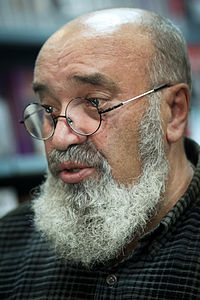
Yevgeni Popov (Krasnojarsk, 5 januari 1946)
De Amerikaanse dichter William De Witt Snodgrass werd geboren op 5 januari 1926 in Wilkinsburg, Pennsylvania. Zie ook alle tags voor William Snodgrass op dit blog.
Nightwatchman’s Song
After Heinrich I. F. Biber
I
What’s unseen may not exist—
Or so those secret powers insist
That prowl past nightfall,
Enabled by the brain’s blacklist
To fester out of sight,
So we streak from bad to worse,
Through an expanding universe
And see no evil.
On my rounds like a night nurse
Or sentry on qui vive,
I make, through murkier hours, my way
Where the sun patrolled all day
Toward stone-blind midnight
To poke this flickering flashlamp’s ray
At what’s hushed up and hidden.
Lacking all leave or protocol,
Things, one by one, hear my footfall,
Blank out their faces,
Dodge between trees, find cracks in walls
Or lock down offices.
Still, though scuttling forces flee
Just as far stars recede from me
To outmost boundaries,
I stalk through ruins and debris,
Graveyard and underground.
Led by their helmetlantern’s light
Miners inch through anthracite;
I’m the unblinking mole
That sniffs out what gets lost or might
Slip down the world’s black hole.
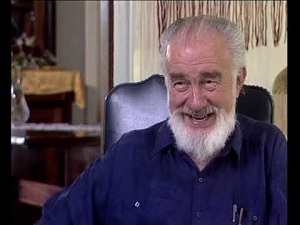
William Snodgrass (5 januari 1926 – 13 januari 2009)
De Franse dichter en uitgever Pierre Seghers werd geboren op 5 januari 1906 in Parijs. Zie ook alle tags voor Pierre Seghers op dit blog.
Le nègre Bungalow
Le nègre Bungalow dans son île flottante
A quatre boules bleues, quatre boules de mer
Quatre étoiles d’or pur et quatre bulles d’air
Un chandelier d’argent dont les chandelles chantent.
Une harpe qu’Eole a touchée. Ses cheveux
Le nègre Bungalow les tisse sur les planches
Sa barque est enchantée sous sa peinture blanche
Il jongle, il joue, les jours qu’il pêche sont des jeux.
Il a deux cocotiers qui donnent des amandes
Un fusil de cristal, une bague de feu
Un grand voile de ciel qu’ il décloue quand il veut
draper d’azur et d’eau ses filles de lavande.
Il tangue sur son île où le voient les poissons,
Il passe, il rit, et les étoiles le préfèrent
Les sept mages postés aux bouches de la mer
L’annoncent : Il viendra… Les constellations
retroussent dans le ciel leurs cheveux de nuages
Andromède et Vénus l’attendent. Le chanteur
va venir, et les galaxies pressent leur coeur
C’est le fait de leur nuit qu’il boit à son passage.
Il s’en vient, il s’en va de L’Arctique au Pégal,
Il souffle le bonheur dans de grandes coquilles
Des sorciers bottés se rongent sous la quille
Et son cheval marin se fait un vrai cheval.
Pégase, Bungalow, Icare, Poésie…
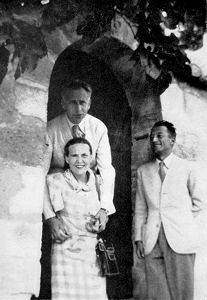
Pierre Seghers (5 januari 1906 – 4 november 1987)
Hier in 1942, rechts op de foto, met collegaschrijvers Louis Aragon and Elsa Triolet
De Oostenrijkse schrijver Fred Wander werd geboren op 5 januari 1917 in Wenen als Fritz Rosenblatt. Zie ook alle tags voor Fred Wander op dit blog.
Uit: Worüber ich schreibe
„Wenn ich sage, mein Thema ist das Überleben – wie überlebt der Mensch in der Katastrophe, dann meine ich das nicht nur physisch, und nicht Menschen in der Gruppe, sondern Einzelgänger meine ich, den nomadischen Typ, den Flüchtling, den Andersartigen und Außenseiter, den Mißachteten und Gehaßten. Denn der Mensch findet sich selbst besser im Unbekannten, als in der Geborgenheit seines Stammes. Und er ist dann besser geeignet, in sich die Menschheit als Ganzes zu erleben. Auch das ist das zentrale Thema: Die Selbstfindung in der Fremde und Anonymität. Und ich habe mein Leben lang nach exemplarischen Beispielen Ausschau gehalten, von Leuten, die fast nichts besitzen, kaum Bedürfnisse haben und doch Freude am Dasein finden. Ich meine nicht Heilige, sondern ganz einfache und manchmal sogar ungeschickte Menschen, die wenig brauchen, um viel zu erleben. Die oft geradezu ekstatisch zu leben verstehen, in einer Freiheit, die nur sie kennen. Deren Lebenskunst in der Mischung der Gegensätze liegt, in der Spannung der Kontraste zwischen äußerster Trauer und dann wieder Lebensfreude, manchmal in überschäumender, wilder Energie – und manchmal in marmorner Ruhe, wenn der Boden wankt. Einige von diesen Leuten habe ich in meinen Erzählungen zu zeichnen versucht.“
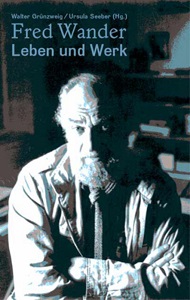
Fred Wander (5 januari 1917 – 10 juli 2006)
Cover biografie
De Engelse dichter Humbert Wolfe werd geboren op 5 januari 1885 in Milaan. Zie ook alle tags voor Humbert Wolfe op dit blog.
Give me the wings
Give me the wings, magician! So their tune
Mix with the silver trumpets of the Moon,
And, beyond music mounting, clean outrun
The golden diapason of the sun.
There is a secret that the birds are learning
Where the long lanes in heaven have a turning
And no man yet has followed: therefore these
Laugh hauntingly across our usual seas.
I’ll not be mocked by curlews in the sky;
Give me the wings, magician, or I die.
On Betelgeuse
On Betelgeuse
the gold leaves hang in golden aisles
for twice a hundred million miles,
and twice a hundred million years
they golden hang and nothing stirs,
on Betelgeuse.
Space is a wind that does
not blow on Betelgeuse,
and time – oh time – is a bird,
whose wings have never stirred
the golden avenues of leaves
on Betelgeuse.
On Betelgeuse
there is nothing that joys or grieves
the unstirred multitude of leaves,
nor ghost of evil or good haunts
the gold multitude
on Betelgeuse.
And birth they do not use
nor death on Betelgeuse,
and the God, of whom we are
infinite dust, is there
a single leaf of those
gold leaves on Betelgeuse.
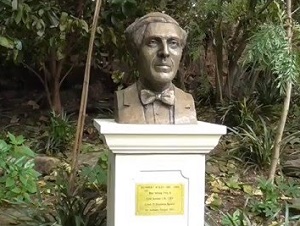
Humbert Wolfe (5 januari 1885 – 5 januari 1940)
Borstbeeld in Londen
De Engelse schrijfster Stella Gibbons werd geboren op 5 januari 1902 in Londen. Zie ook alle tags voor Stella Gibbons op dit blog.
Uit:Cold Comfort Farm
“Mrs Smiling’s character was firm and her tastes civilized. Her method of dealing with wayward human nature when it insisted on obtruding its grossness upon her scheme of life was short and effective; she pretended things were not so: and usually, after a time, they were not. Christian Science is perhaps a larger organization, but seldom so successful. ‘Of course, if you encourage people to think they’re messy, they will be messy,’ was one of Mrs Smiling’s favourite maxims. Another was, ‘Nonsense, Flora. You imagine things.’ Yet Mrs Smiling herself was not without the softer graces of imagination. `Well, darling,’ said Mrs Smiling – and Flora, who was tall, bent and kissed her cheek – ‘will you have tea, or a cocktail?’ Flora said that she would have tea. She folded her gloves and put her coat over the back of a chair, and took the tea and a cinnamon wafer. ‘Was the funeral awful?’ enquired Mrs Smiling. She knew that Mr Poste, that large man who had been serious about games and contemptuous of the arts, was not regretted by his child. Nor was Mrs Poste, who had wished people to live beautiful lives and yet be ladies and gentlemen. Flora replied that it had been horrid. She added that she was bound to say all the older relatives seemed to have enjoyed it no end.
`Did any of them ask you to go and live with them? I meant to warn you about that. Relatives are always wanting you to go and live with them,’ said Mrs Smiling. `No. Remember, Mary, I have only a hundred pounds a year now; and I cannot play Bridge.’ `Bridge? What is that?’ enquired Mrs Smiling, glancing vaguely out of the window at the river. ‘What curious ways people have of passing their time, to be sure. I think you are very fortunate, darling, to have got through all those dreadful years at school and college, where you had to play all those games, without getting to like them yourself. How did you manage it?’ Flora considered. `Well – first of all, I used to stand quite still and stare at the trees and not think about anything. There were usually some trees about, for most games, you know, are played at in the open air, and even in the winter the trees are still there. But I found that people would bump into me, so I had to give up standing still, and run, like the others. I always ran after the ball because, after all, Mary, the ball is important in a game, isn’t it? until I found they didn’t like me doing that, because I never got near it or hit it or did whatever you are supposed to do to it.”
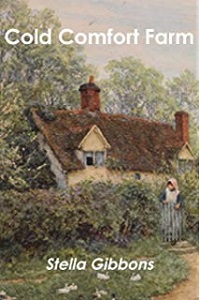
Stella Gibbons (5 januari 1902 – 19 december 1989)
Cover
De Spaanse (Catalaanse) schrijver Terenci Moix werd geboren op 5 januari 1942 in Barcelona. Zie ook alle tags voor Terenci Moix op dit blog.
Uit: Looking Queer – Terenci Moix
(In: The Hispanic Homograph: Gay Self-representation in Contemporary Spanish Autobiography door Robert Richmond Ellis)
“When Terenci Moix was fourteen years old, he first witnessed an act of civil disobedience. As he was about to purchase a copy of La Van-guardia from a kiosk on the Paralelo of Barcelona, a throng of Catalan dissi-dents suddenly burst down the street, shouting and seizing newspapers. At the time, he was completely unaware of the historical significance of the in-cident, and as the police began to club and arrest the protesters, he felt a pro-found sense of relief. And with good reason too. After all, poor Norma Shearer had been led off to the guillotine by a similar sort of mob in the film Marie Antoinette. According to his autobiographical volumes, El cine de los stibados [The Saturday matinee] and El beso de Peter Pan (The kiss of Peter Pan), Hollywood cinema (and to a lesser degree radio, comics, and film in general) determined his childhood vision of the world and himself and con-stituted him as “la perfecta imagen del jovencito colonizado” (199) [the per-fect image of the colonized little lad]! This cinematic colonization preceded his birth (his mother supposedly went into labor during a screening of Gas-light), fixing the parameters of his alienation as a gay youth while simulta-neously establishing the context for his eventual act of defiance as an openly gay writer and autobiographer. For the young Moix, however, cinema was.”
Uit: The Kiss of Peter Pan
“When Peter Pan kissed me in a pergola of the gardens of Never Land, I was afraid that his love might be a one-day flower, and I decided to seize his dagger in order to force him to return to me in moments of danger. But the hero assured me that such a precaution was unnecessary because we would never be parted. By way of confirmation we made cuts in our wrists and mixed our blood and therefore I know that through my veins flows the star dust that only eternal children have.”
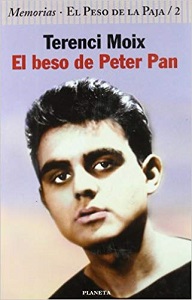
Terenci Moix (5 januari 1942 – 2 april 2003)
Cover

